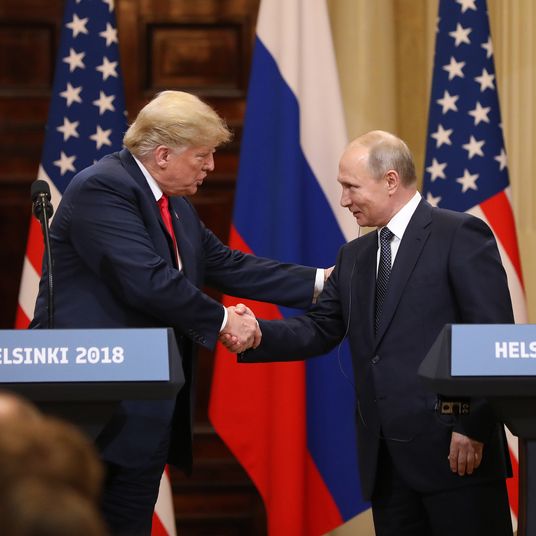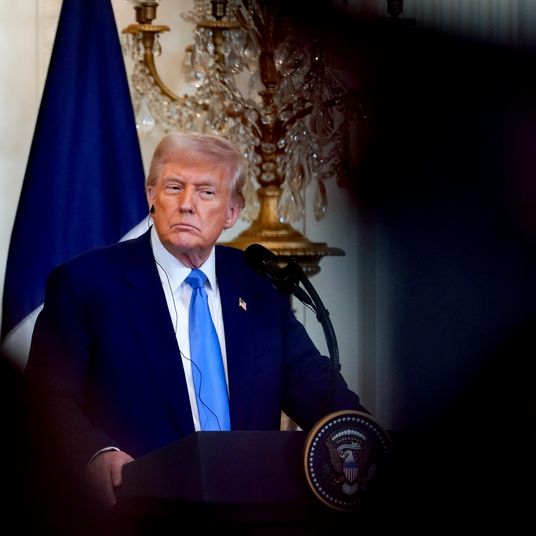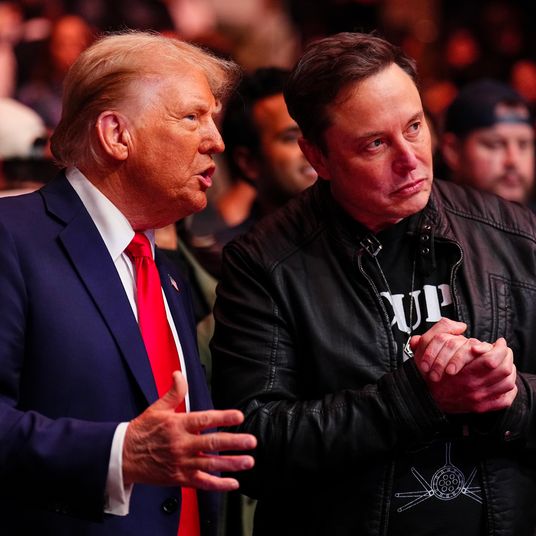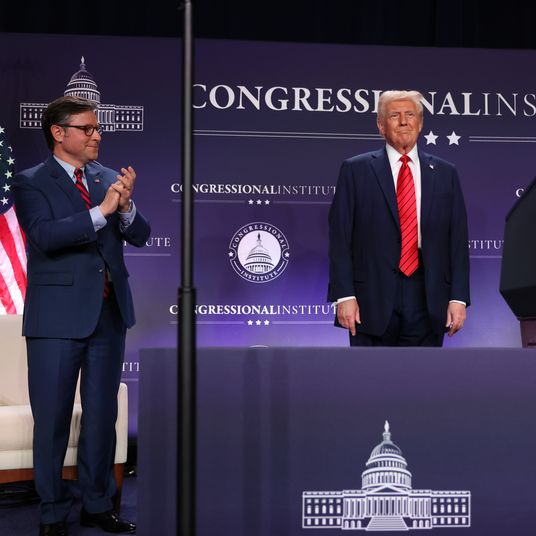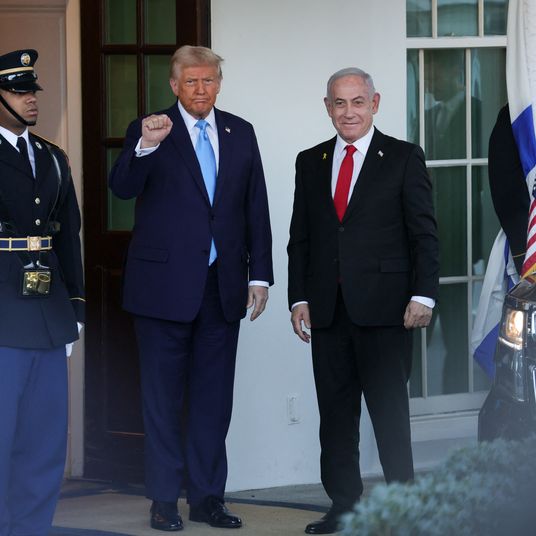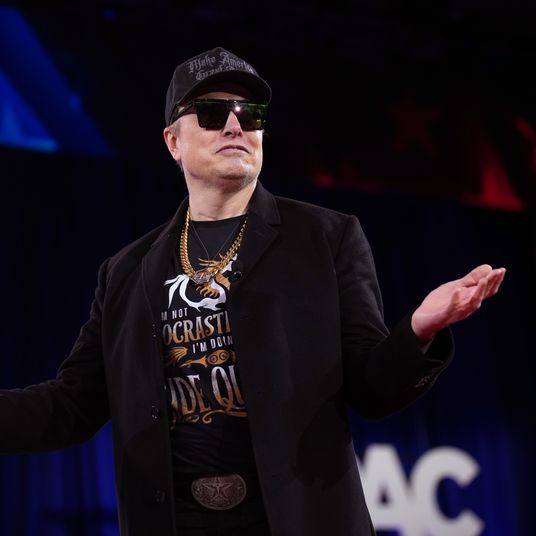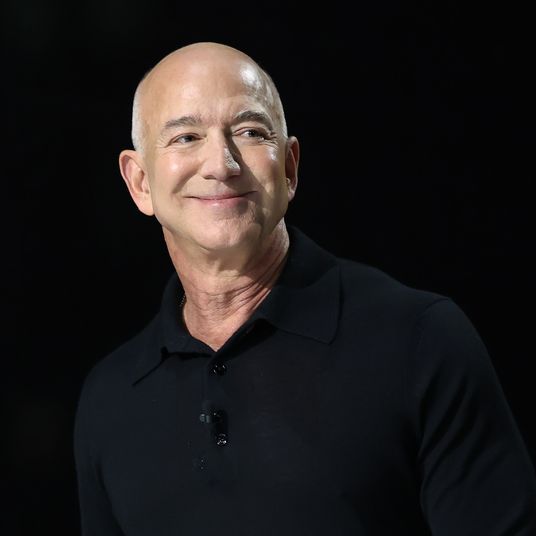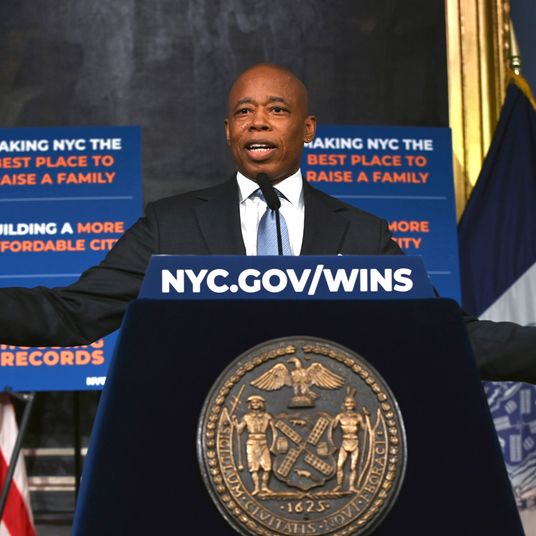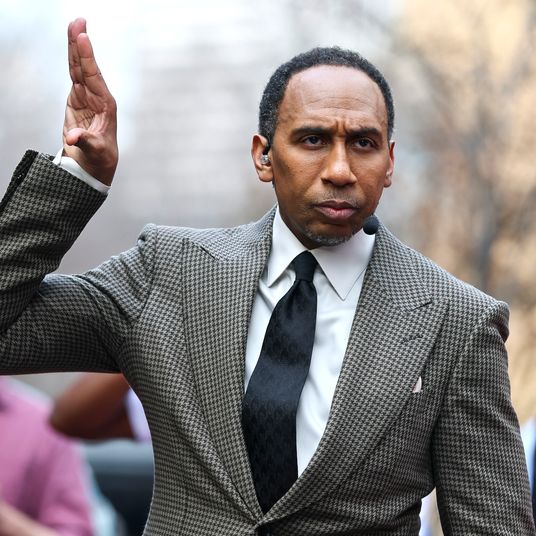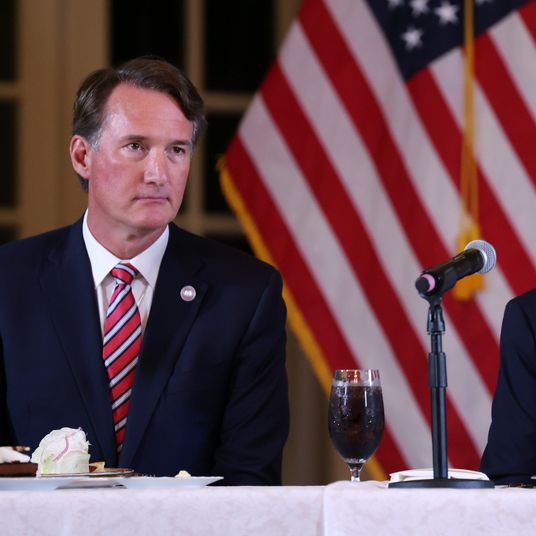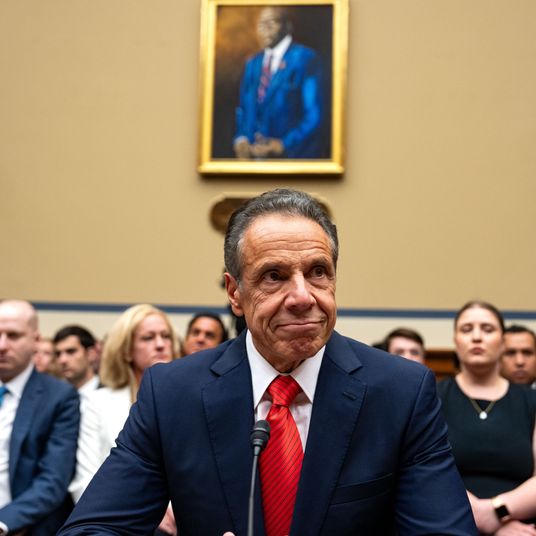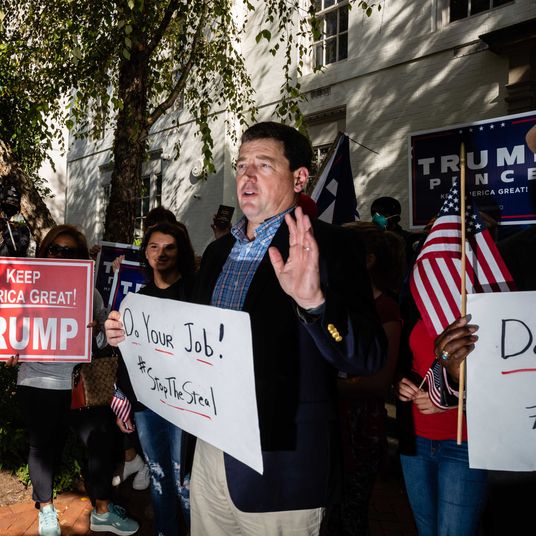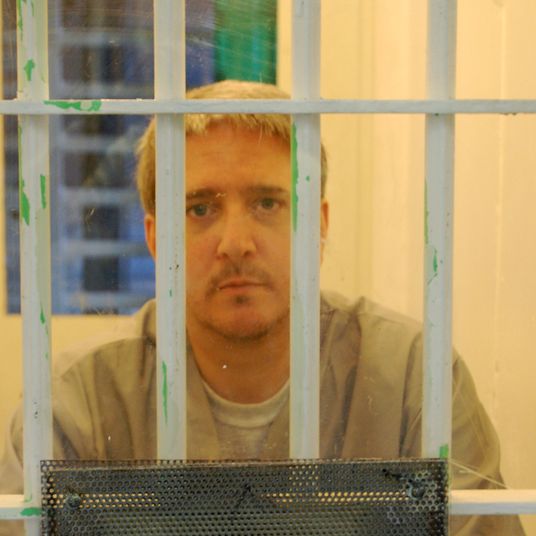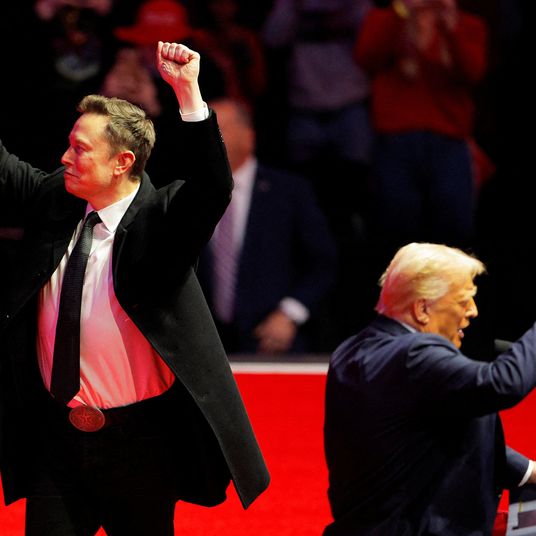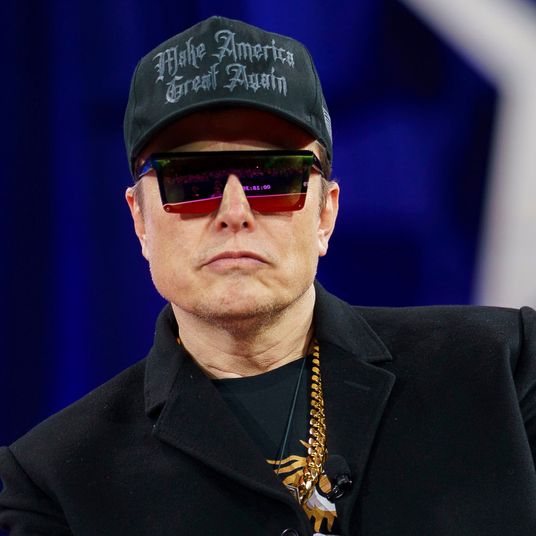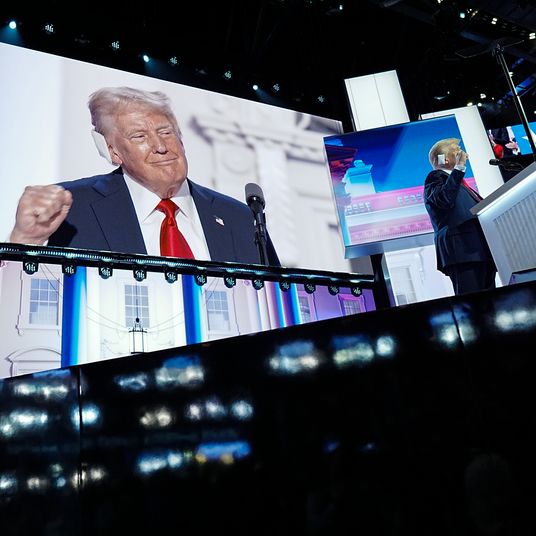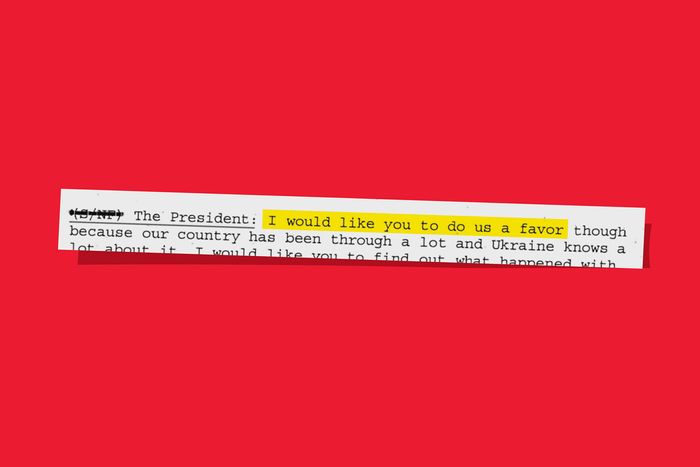
History books will record Donald Trump as the first president of the United States to assume office without any previous experience in government. This is not a mere biographical detail but a skeleton key for understanding his methods of wielding power. Trump has never recognized any distinction between his public and private life. Extraordinarily, he didn’t divest from his businesses even while serving as president. Even worse, he treated the government as if it were his property. The Ukraine scandal is another case of Trump treating the executive branch as though it had been acquired by the Trump Organization. It may or may not be the worst of his many offenses, but it would be perfectly fitting if, as now seems possible, it is ultimately the instrument of his demise.
The scandal revolves around Trump turning American foreign policy toward Ukraine into an extortion scheme for his political benefit. The plot began as early as this spring and at first was mostly conducted in broad daylight. Trump deputized his lawyer, Rudy Giuliani, to undertake this mission.
Giuliani’s original goal was to prod Ukraine to turn over evidence that would exonerate Paul Manafort, the former Trump campaign manager. Manafort had worked in Ukraine for a pro-Russian party, then gone on to manage Trump’s campaign while maintaining secret contacts with a Russian intelligence officer, and he was helping Trump in 2018 by withholding cooperation from special counsel Robert Mueller. Giuliani was attempting to prove that Manafort had been set up by Ukrainians working with the Clinton campaign and that — even more bizarrely — Ukrainians had stolen Clinton’s emails.
If these theories sound fantastical, they are. But just as Watergate demystified the White House staff as bumblers, the Ukraine scandal has revealed Trump and his allies are suffering from Fox News poisoning. The bizarre conspiracy theories that the rest of us took to be devious propaganda had a profound impact on the president and his inner circle. They are not-very-bright guys who also happen to be genuinely nuts.
But the mission followed a coherent strategic goal. Trump thrives on cynicism, excusing his misconduct with the assumption everybody does it — simultaneously condoning his own failings while dragging his antagonists down to his level. His election required many Americans to believe his opponent had engaged in criminal behavior. He has instinctively replicated those conditions in his quasi-campaign against Mueller as well as against the Democrats in 2020.
In the course of his work, Giuliani made contact with Ukrainian prosecutors and hit upon yet another conspiracy theory. The story held that, during the Obama administration, Joe Biden had called for the firing of a prosecutor who was on the tail of a Ukrainian firm that had hired his son Hunter. This theory, too, was wrong. Hunter Biden had gone to work for a Ukrainian energy firm as part of a generally sleazy practice of trading on his father’s name. And it was true that Joe Biden spearheaded demands to fire a prosecutor. But the prosecutor was not investigating Hunter Biden’s firm at that time. And the vice-president’s call to fire the prosecutor, who was notoriously ineffectual at rooting out corruption, placed him squarely on the side of human-rights activists, democratic countries, the IMF, the World Bank, and other international do-gooders.
President Trump began to focus on the twin goals of pressuring Ukraine’s government to investigate his antagonists from the 2016 election and the leading contender to face him in the next one. He had the benefit of leverage: Ukraine was under military attack from Russia, which had seized a chunk of its territory five years before and was beginning a new offensive. Volodymyr Zelensky, Ukraine’s new president (and, like Trump, a straight-from-television political novice), desperately needed aid from the U.S. to fend off the invasion as well as a meeting with Trump to underscore Trump’s commitment and to discourage Russia from expanding its attacks.
Giuliani spearheaded the effort, holding numerous meetings with Ukrainians to demand the investigations. Far from disguising his role, Giuliani went out of his way to advertise it. “We’re meddling in an investigation … because that information will be very, very helpful to my client,” he boasted to the New York Times in May. The intended audience for his confession was likely Zelensky. The Ukrainian president, after all, needed to understand that this intermittently coherent cable-news shouting head, who did not hold a government job of any kind, did in fact speak on behalf of the world’s most powerful person.
In an April phone call, Trump urged Zelensky to coordinate with Giuliani. Zelensky dragged his feet, causing Trump to increase the pressure. According to the complaint of a CIA officer detailed to the White House, Trump ordered Vice-President Pence not to attend Zelensky’s inauguration (a snub celebrated by Russian television). Trump held up the military aid and withheld the cherished meeting, while Giuliani continued demanding the investigations. Trump reiterated the demands in a second call in July, in which the two presidents danced around each other while making their respective asks perfectly clear.
In recent days, Trump denied ever having made an explicit quid pro quo. “I did not make a statement that ‘you have to do this or I’m not going to give you aid,’ ” he told reporters. “I wouldn’t do that.” This is probably true. As Trump’s former fixer Michael Cohen testified, he “speaks in a code.” Trump makes it clear that he views relationships as transactional and lets counterparties know what he wants from them. Trump phrased his demands as rooting out “corruption” (i.e., “We’re giving a lot of money away to Ukraine and other places. You want to see a country that’s going to be not corrupt”), but nobody mistook him as a wide-eyed advocate of good government.
Trump’s salad days as a young builder working Mob contacts and crooked politicians left him with the belief that greasing palms is how business gets done. He has imported that style to the presidency, letting it be known that putting money in his pocket is the entry price to secure his favor.
(In their phone call, Zelensky mentions that he had stayed in one of Trump’s New York properties.) He has cozied up to a rogues’ gallery of the world’s most corrupt states (including Russia and the Gulf kingdoms). Trump believes in corruption at an almost ideological level. He is not only corrupt but a corruptionist.
Both Ukrainians and American officials, the Times reported, understood his talking about the term “as code” — there’s the word Cohen used again — “for the Bidens and Ukrainians who released damaging information about the Trump campaign in 2016.” Trump has even translated the code himself. Asked by a reporter if he “raised Joe Biden or his son’s name with Ukraine,” the president replied, “Well, I don’t even want to mention it, but certainly I’d have every right to. I’d have every right to. If there’s corruption, and we’re paying lots of money to a country, we don’t want a country we’re giving massive aid to to be corrupting our system, and we don’t want it to be corrupt in any way.”
The Ukrainians “expressed concern to U.S. senators that the aid had been held up as a penalty for resisting that pressure” to investigate Biden, reported The Wall Street Journal. In an early-September press conference, a reporter asked Pence if the aid was being held up over Ukraine’s failure to open the investigations requested by Giuliani. Pence did not deny it. Instead, he reiterated the threat in the familiar code. After insisting that the U.S. stands behind Ukraine, he warned, “But as President Trump had me make clear, we have great concerns about issues of corruption.”
Trump’s diplomatic interactions have prioritized using foreign leaders to solicit endorsements. He regularly boasts that world leaders praise him and mock his enemies behind closed doors. Trump told reporters in May, “Kim Jong-un made a statement that Joe Biden is a low-IQ individual,” as if Americans should trust the assessment of a possibly insane dictator. His efforts with Ukraine took that tendency to an extreme, pushing for a formal investigation that he could brandish as evidence of guilt.
Trouble is, American foreign policy is not designed to jack up other countries to supply dirt on the president’s enemies. Trump had to jury-rig the system to run it through a non-diplomat without security clearance or even a government job, who represented not the U.S. government but Trump personally. And when American diplomats and members of Congress raised concerns, he engaged in a cover-up that recruited numerous officials, some of them high ranking, into the plot.
Pence and Mick Mulvaney, Trump’s acting chief of staff and budget director, were tasked with disseminating cover stories to explain the holdup with aid. (Pence, for one, almost certainly knew the real story.) White House officials hid the records of Trump’s phone calls with Zelensky on a classified system, fearing they contained incriminating evidence of Trump using the Ukrainian leader for domestic political gain. When the CIA operative filed an official complaint about the scheme, the Inspector General for the Intelligence Community deemed it credible, but the acting director of national intelligence didn’t send it to Congress, and the Department of Justice quashed a referral for a criminal investigation. Attorney General William Barr did not recuse himself, even though Barr himself is implicated. (On the second Zelensky call, Trump promises to put Barr on the Biden case, reflecting once again his faith in his AG’s subservience and total lack of professional ethics.)
Trump’s Ukraine policy was at best illegitimate and at worst illegal, so there was no way to operate it through normal channels. The cover-up rippled through the bureaucracy. Trump’s accomplices have already begun fingering each other. Giuliani waved around his phone on a Fox News segment, claiming it contained messages authorizing his actions from the State Department — which, if true, may implicate Mike Pompeo, who was just subpoenaed by three House committees. “I’m the real whistle-blower,” he later warned his co-conspirators. “If I get killed now, you won’t get the rest of the story.” Trump told reporters, “I think you should ask for Vice-President Pence’s conversations, because he had a couple conversations also,” a helpful reminder that if Trump goes down, his subordinate might, too.
The most committed of Trump’s defenders have insisted that he is the victim of smears or the usual litany of Fake News, radical socialists, and their allies in the intelligence community. A somewhat more sophisticated defense has emerged, predicated on the absence of an explicit statement by Trump that he would grant the aid and the meeting in return for the investigations. They are circulating the same pointillistic defenses of his statements and actions they used during the Russia scandal, analyzing each statement in isolation and in the most favorable light, ignoring the unmistakable context. The Wall Street Journal’s editorial page insists that in the second phone call, Zelensky brings up Giuliani and his investigative demands before Trump mentions them, as if Zelensky had thought up the idea of investigating Biden himself, rather than having faced months of pressure to do it.
What almost none of the Republicans have dared offer is a positive defense of his actions. Their shyness reflects a surprising consensus that withholding military aid to force Ukraine to investigate Biden — i.e., exactly what Trump did — is deeply improper. A September 24 YouGov poll asked: If Trump “suspended military aid to Ukraine in order to incentivize the country’s officials to investigate his political rival, Joe Biden,” is impeachment warranted? Fifty-five percent supported impeachment, with only 26 percent opposed. No wonder Trump’s defenders have concluded their only viable defense is to dispute the factual premise.
The public remains divided on impeachment, reflecting the fact that the scandal remains unfamiliar to many. Democrats must prove their case to the public, but if they do, they have a path to a solid majority. They have weeks of hearings to drive home the known facts and produce additional evidence. The cynical and historically correct assumption is that Republicans will rally around the president who boasted he could shoot somebody on Fifth Avenue without losing any support.
Yet there is at least some reason to suspect this episode might play differently. The customary phalanx of Republicans has failed to materialize. “I want to say to the president, ‘This is not okay,’ ” scolded Ohio Republican Mike Turner. “I think it’s disappointing to the American public when they read the transcript.” Mitt Romney said he was “deeply troubled” by Trump’s behavior. Ben Sasse, who has curried Trump’s favor, said his party “ought not just circle the wagons.” Dozens of Republicans either refused to comment or said they needed more information.
Most of the holdouts will hop back on the Trump train eventually. But their lack of vocal support creates a favorable asymmetry for Democrats as the impeachment process begins. Democrats are unanimous in their condemnation of Trump’s behavior, while Republicans are divided, giving Democrats an opportunity to split wide open the crack in the Republican wall. The appearance of more evidence against Trump might conceivably cause them to defect. It is, at least, no longer unimaginable.
Trump responded to the threat of impeachment by reaffirming why he deserves it. He told reporters that impeachment (a mechanism in the Constitution) “shouldn’t be allowed. There should be a way of stopping it.
Maybe legally through the courts.” And he told a private audience that the media reporting the story were “animals” and “scum” and said the CIA officer who filed the complaint (through approved legal channels) committed “treason” and implied that he should be executed. L’état, c’est Trump, as always.
Part of Trump’s rage stemmed from what appeared to be genuine surprise that the record of him pressuring Zelensky failed to win the approbation he expected. Hadn’t Zelensky flattered him and noted his great electoral victory? Didn’t his counterpart meekly submit to Trump’s demands? How could this be received as anything other than the “perfect” conversation Trump had promised it would be?
Representative Mark Meadows, one of Trump’s more slavish followers, observed in the president’s defense, “He didn’t see anything wrong with the conversation he had with a foreign leader.” That is probably accurate. Trump has a finely honed antenna for assessing winner versus loser, or loyal versus disloyal. But the formulation of moral concepts is not a function he can perform. His brain is no more capable of distinguishing right from wrong than your microwave oven can tell you what’s on Netflix. No American president has more richly deserved impeachment.
*This article appears in the September 30, 2019, issue of New York Magazine. Subscribe Now!
MORE ON THE TRUMP-UKRAINE SCANDAL
- Trump’s Impeachment Trial and the Verdict of History
- Trump Fires Impeachment Witnesses Alexander Vindman and Gordon Sondland
- Trump Impeachment Hearing Schedule: What’s Next?
- The Senate Impeachment Trial Returns to Its Foregone Conclusion
- The Impeachment Trial Became Saturday Detention for Senators







